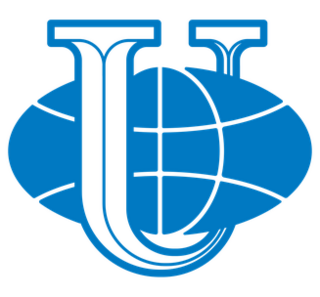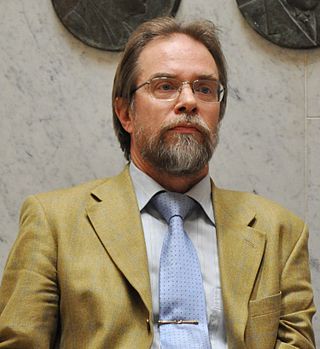The Fulbright Program, including the Fulbright–Hays Program, is one of several United States cultural exchange programs with the goal of improving intercultural relations, cultural diplomacy, and intercultural competence between the people of the United States and other countries through the exchange of persons, knowledge, and skills. Via the program, competitively-selected American citizens including students, scholars, teachers, professionals, scientists, and artists may receive scholarships or grants to study, conduct research, teach, or exercise their talents abroad; and citizens of other countries may qualify to do the same in the United States.

The Russian Academy of Sciences consists of the national academy of Russia; a network of scientific research institutes from across the Russian Federation; and additional scientific and social units such as libraries, publishing units, and hospitals. Peter the Great established the academy in 1724 with guidance from Gottfried Leibniz.
A national academy is an organizational body, usually operating with state financial support and approval, that co-ordinates scholarly research activities and standards for academic disciplines, and serve as public policy advisors, research institutes, think tanks, and public administration consultants for governments or on issues of public importance, most frequently in the sciences but also in the humanities. Typically the country's learned societies in individual disciplines will liaise with or be coordinated by the national academy. National academies play an important organisational role in academic exchanges and collaborations between countries.
An academician is a full member of an artistic, literary, engineering, or scientific academy. In many countries, it is an honorific title used to denote a full member of an academy that has a strong influence on national scientific life.

The Royal Society of Canada, also known as the Academies of Arts, Humanities, and Sciences of Canada, is the senior national, bilingual council of distinguished Canadian scholars, humanists, scientists, and artists. The primary objective of the RSC is to promote learning and research in the arts, the humanities, and the sciences. The RSC is Canada's national academy. It promotes Canadian research and scholarly accomplishment in both official languages, recognizes academic and artistic excellence, and advises governments, non-governmental organizations, and Canadians on matters of public interest.

The Patrice Lumumba Peoples' Friendship University of Russia, also known as RUDN University and until 1992 and after March 2023, as Patrice Lumumba University in honour of the Congolese politician Patrice Lumumba, is a public research university located in Moscow, Russia. It was established in 1960 by a resolution from the Central Committee of the CPSU and the Council of Ministers of the USSR to help nations to assist countries that had recently achieved independence from colonial powers. The university also acted to further Soviet foreign policy goals in nonaligned countries.

Fujian Normal University is a public university in Fuzhou, China. FNU has been hailed as the Fujian province's "Cradle of teachers."

Northeast Normal University is a public normal university in Changchun, Jilin, China. It is affiliated with the Ministry of Education, and co-funded by the Ministry of Education and the Jilin Provincial People's Government. The university is part of Project 211 and the Double First-Class Construction.

The National Academy of Sciences of Ukraine is a self-governing state-funded organization in Ukraine that is the main center of development of science and technology by coordinating a system of research institutes in the country. It is the main research oriented organization along with the five other academies in Ukraine specialized in various scientific disciplines. NAS Ukraine consists of numerous departments, sections, research institutes, scientific centers and various other supporting scientific organizations.

Yerevan State University, also simply University of Yerevan, is the oldest continuously operating public university in Armenia. Founded in 1919, it is the largest university in the country. It is thus informally known as Armenia's "mother university". Of its 3,150 employees, 1,190 comprise the teaching staff, which includes 25 academicians, 130 professors, 700 docents, and 360 assistant lecturers. The university has 400 researchers, 1,350 post-graduate students, and 8,500 undergraduates, including 300 students from abroad.

The Academia Europaea is a pan-European Academy of Humanities, Letters, Law, and Sciences. The Academia was founded in 1988 as a functioning Europe-wide Academy that encompasses all fields of scholarly inquiry. It acts as co-ordinator of European interests in national research agencies.

Ilkka Aulis Hanski was a Finnish ecologist at the University of Helsinki, Finland. The Metapopulation Research Center led by Hanski, until his death, has been nominated as a Center of Excellence by the Academy of Finland. The group studies species living in fragmented landscapes and attempts to advance metapopulation ecology research. Hanski proposed the core-satellite hypothesis of species distributions. Metapopulation ecology itself studies populations of plants and animals which are separated in space by occupying patches.

The Turkish Academy of Sciences is an autonomous scholarly association aimed at promoting scientific activities in Turkey. Although it is attached to the office of the Presidency and is largely funded by the government, it maintains financial and administrative autonomy. The academy is headquartered in Ankara.

Arto Kustaa Salomaa is a Finnish mathematician and computer scientist. His research career, which spans over forty years, is focused on formal languages and automata theory.

Michael Grätzel is a professor at the École Polytechnique Fédérale de Lausanne where he directs the Laboratory of Photonics and Interfaces. He pioneered research on energy and electron transfer reactions in mesoscopic-materials and their optoelectronic applications. He co-invented with Brian O'Regan the Grätzel cell in 1988.

Arkady Ivanovich Melua is the general director and editor-in-chief of the scientific publishing house, Humanistica.
Dipankar Das Sarma, popularly known as D.D. Sarma, is an Indian scientist and structural chemist, known for his researches in the fields of Solid State Chemistry, Spectroscopy, Condensed Matter Physics, Materials Science, and Nanoscience. He is a former MLS Chair Professor of Physics and Chairman of the Centre for Advanced Materials and the GAST Professor of Uppsala University, Sweden, A recipient of TWAS Physics Prize and the UNESCO Biennial Javed Husain Prize, Sarma was honored by the Council for Scientific and Industrial Research (CSIR), Government of India, in 1994, with the Shanti Swarup Bhatnagar Prize for Science and Technology.
In some countries, an academy professor is a scientist appointed to function as professor and/or conferred to the official professor rank by the academy of sciences of that country, rather than by a university establishment.

The Academy of Sciences Malaysia is a statutory body in the Malaysian government established under an act of Parliament. The Academy, abbreviated as ASM, is the highest scientific advisory body of Malaysia, and is organizationally under the Ministry of Science, Technology and Innovation (MOSTI).
Eva-Mari Aro is a Finnish biologist and professor of plant molecular biology at the University of Turku, Finland. Her research has focused on the function, regulation, damage, repair, and evolution of the machinery of photosynthesis, with applications in renewable energy. She was elected to the Finnish Academy of Science and Letters in 2001 and was elected a foreign associate of the National Academy of Sciences in 2018.














